A recent SAP study reveals that 86% of Indian businesses believe sustainability boosts profitability, with 77% experiencing significant revenue or profit growth and 84% noting improved efficiency. It is clear that going green is not just good for Mother Earth but is equally great for raising the bottom lines of businesses, too!
No wonder 58% of businesses are expecting positive financial returns from sustainability investments within five years, with 39% planning to ramp up their green investments in the next 3 years. Undoubtedly, in today’s business world, sustainability acts like that secret ingredient in grandma’s recipe that makes everything better. After all, who doesn’t prefer being efficient while saving the planet and making more money?
On this note, we at the Tribhuvan College of Environment and Development Sciences, recognized among the best environmental science colleges in Delhi, will be sharing with you in this blog post today a few strategies for integrating sustainability into business practices. So, let’s read on.
-
Green Energy, Bigger Profits:
Investing in energy-efficient technologies and practices is a smart way of slashing energy consumption and costs while boosting sustainability. Here’s where businesses must think of LED lighting, smart thermostats, and energy-efficient machinery. And of course pair this with renewable energy sources like solar, wind, and geothermal alternatives.
Let’s take Google, for instance. They have been awarded for their energy-efficient operations after they powered their data centres with renewable energy, cutting their energy use to half. These initiatives are more like putting a business on an eco-friendly diet, to trim the harm, boost the green, and watch the profits grow. Definitely, an effective integration strategy to becoming a green champion in one’s industry.
-
Turning into Waste Warriors:
Waste reduction acts as another powerful strategy to integrate sustainability into business practices. It helps to implement programs for recycling and composting, which come together to make a world of difference. In fact, the 3Rs—Reduce, Reuse, Recycle being written into the company’s vision and mission statements can prove a massive game changer.
It’s safe to say that this strategy leads to less waste piling up and more resources being saved. Moreover, segregating waste properly ensures that recyclables and compostable don’t end up in landfills. At the Tribhuvan College of Environment and Development Sciences, we make waste reducation a priority so that our students, who are likely to become business owners of tomorrow, know exactly what steps to take to get sustainability on their side of the business.
-
Welcoming Green Packaging:
Businesses need to realize that green packaging isn’t just a trend; it’s a motivator for sustainability! Using eco-friendly materials for packaging shows the target audience that a company isn’t just running for money but is equally serious about doing right for the planet.
As historian and activist, Robert Swan puts it, “The greatest threat to our planet is the belief that someone else will save it.” Businesses must take note of this quote and turn to green packaging options, including biodegradable materials like cornstarch and recycled paper. Likewise, usage of plant-based inks and compostable films shall prove helpful in protecting the product while ensuring a sustainable future for the planet.
-
Reframing Office Dynamics:
Eco-friendly office design, hybrid working, and paperless operations are key to integrating sustainability into business. An office designed with sustainable materials and energy-efficient systems shall reduce environmental impact while boosting employee well-being.
Hybrid working shall cut down on daily commutes, lowering carbon footprints. Going paperless shall eliminate the need for excessive paper, conserving resources and reducing waste.
The planet is in a climate emergency, which is why we need to act now. Businesses must realize this and eventually contribute to a greener planet while benefitting in the form of operational efficiency and adaptation to modern work trends.
-
Sustainable Sourcing:
At the Tribhuvan College of Environment and Development Sciences, we strongly believe sustainable sourcing is the way ahead as it aligns the company’s supply chain with its sustainability values.
It’s like finding the perfect match for a business begins with looking for suppliers who prioritize eco-friendly practices and ethical standards. This approach ensures that the products and materials used by a business come from sources that respect the environment and its communities.
At the end of the day, the goal should be to create a sustainable business that thrives while enhancing the world around it.
Summing Up:
Sustainability in business practices is crucial for long-term success and environmental well-being. Starting with baby steps, like reducing waste and conserving energy, shall lead to significant positive impacts. These small actions shall set the foundation for more extensive changes and demonstrate a company’s commitment to responsible practices.
Through this blog post today, we at the Tribhuvan College of Environment and Development Sciences, positioned among the well-known environmental science colleges in Delhi, would like to urge businesses of all scales and sizes to ensure they are doing their bit towards saving the environment. Every step counts. Adopting sustainable practices will not only help businesses improve their environmental footprint but also build a reputation for being forward-thinking and conscientious, ultimately benefiting both the planet and their bottom line. Definitely a win-win for all!

